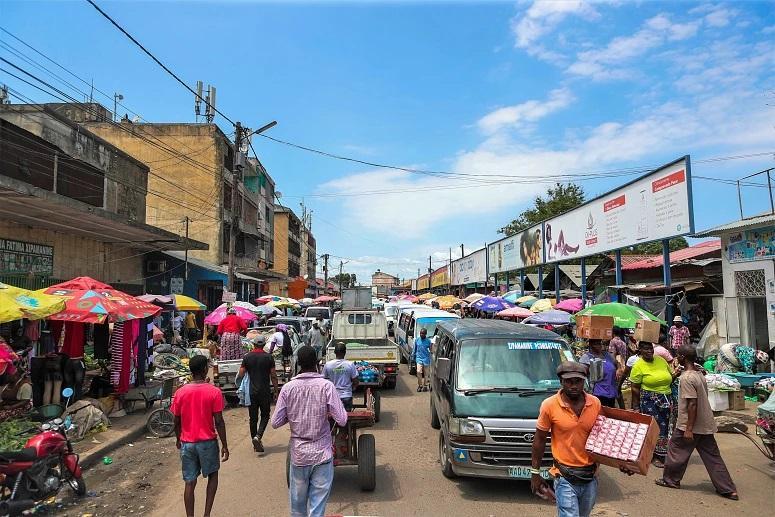Africa-Press – Mozambique. On an atypical morning, Edgar Chaúque tries to buy as much food as he can to face the “seven difficult days” that are expected in Mozambique with the forecast of new demonstrations against the election results.
“With Venâncio Mondlane’s latest announcement, we decided to go and buy what we need so that we don’t regret it in the coming days,” the 46-year-old Mozambican explained to Lusa, moments after buying some products in one of the main supermarkets in Kachamanculo, in the suburbs of the Mozambican capital.
In an atypical frenzy for a Wednesday morning in Maputo, according to Edgar, dozens of people have been buying products, with traffic jams on some avenues, in the face of a possible stoppage, fearing a scenario similar to the first three days of demonstrations called by Mondlane in protest against alleged fraud in the 9 October elections.
“Everyone is running around because we don’t know what will happen tomorrow (…) seven days is difficult. The difficult part of all this is the children who won’t be able to go to school. They’re in their last weeks, and they have their last assessments, but deep down, we all want democratic freedom, without violence,” says Cármen João, a few metres away from her car, already full of food products.
The last few days of demonstrations called by Mondlane last week culminated in violent clashes between the Mozambican police and the politician’s supporters in various parts of the country, especially Maputo. On the fringes of the clashes, which took place mainly on the outskirts, Maputo was almost a ghost town, with commerce paralysed.
On Tuesday, in one of his popular “lives” seen by thousands on the social network Facebook, Mondlane called for a week-long general strike starting on Thursday, demonstrations at the district offices of the National Electoral Commission (CNE) and marches to Maputo on 7 November, contesting the results presented by the National Electoral Commission (CNE), which gave victory to Daniel Chapo, supported by the ruling Mozambique Liberation Front (Frelimo), with 70.67% of the vote.
At first, Mondlane called for a “general strike”, but after the murder of his lawyer Elvino Dias and Paulo Guambe, head of the Podemos party, which supports him, he called on his supporters to take to the streets, which led to clashes between demonstrators and the police in various parts of the country, with deaths, injuries and arrests, as well as shops being closed.
Although opinions on the streets regarding the contestation of the results remain divided, for some, what is at stake in Mozambique today goes beyond “political ideologies”: it is a “struggle of the Mozambican people”.
“I’m ready for seven difficult days. Whether we like it or not, we have to hold on. Frelimo has to go,” Nelson Rafael Paunde, a young car washer on Avenida Carlos Morgado and a staunch Mondlane sympathiser told Lusa.
Not far from Kachamanculo, in the Xipamanene market in the Alto Maé neighbourhood, Carlos Baptista, another car washer in the street, says he’s not as ready as Nelson. He acknowledges that he voted for the “VM7 of Mozambican politics”, a political nickname given to him by his supporters in comparison to Portugal’s Cristiano Ronaldo (CR7) in football.
“I voted for Venâncio, but now I see that he’s spoiling things (…) Seven days? We’re going to starve. I’m not ready. I live off the street, and being paralysed for seven days will force me to steal,” Carlos Baptista told Lusa.
While opinions remain divided on the streets, tension is evident on the faces of the majority on every street corner in Maputo, with uncertainty about what will happen over the next few days the only thing that is agreed upon: “Regardless of political parties, this is a battle for all the Mozambican people,” concludes Edgar Chauque.
Venâncio Mondlane, supported by the Optimist Party for the Development of Mozambique (Podemos, extra-parliamentary), came second with 20.32%, but he says he doesn’t recognise these results, which still have to be validated and proclaimed by the Constitutional Council.
Frelimo also strengthened its parliamentary majority, from 184 to 195 seats (out of 250), and elected all 10 of the country’s provincial governors.
In addition to Mondlane, the president of the Mozambican National Resistance (Renamo, currently the largest opposition party), Ossufo Momade, one of the four presidential candidates, said that he does not recognise the election results announced by the CNE and called for the vote to be annulled.
On Thursday, presidential candidate Lutero Simango, supported by the Democratic Movement of Mozambique (MDM), also rejected the results, considering that they were “forged in the secretariat”, and promised “political and legal action” to restore the “will of the people”.
The Centre for Public Integrity (CIP), a Mozambican non-governmental organisation that monitors electoral processes, estimates that ten people died, dozens were injured, and around 500 were arrested in the context of the protests and clashes during the strike and demonstrations on Thursday and Friday, which followed similar violent clashes on 21 October, also called by Mondlane.
For More News And Analysis About Mozambique Follow Africa-Press






